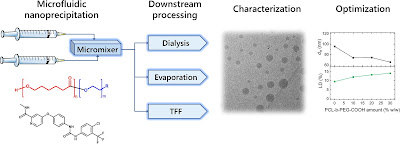Amphiphilic block copolymers which have hydrophilic and hydrophobic chains have the ability to self-assemble into colloidal particles enabling delivery of drugs which have poor bioavailability. Sorafenib is a kinase inhibitor approved for the treatment of liver, kidney and thyroid cancers, however its poor solubility and side effects have limited its clinical applications. Researchers at University of Helsinki, University of Lisbon, Aalto University, and University of Groningen used PCL-PEG-COOH (Cat# AI157) from PolySciTech Division of Akina, Inc. (www.polyscitech.com) to create nanoparticles with controlled interactions, size, and zeta-potential for delivery of sorafenib by leveraging microfluidic systems. This research holds promise to improve the utilization of microfluidics for cancer treatment. Read more: Känkänen, Voitto, Micaela Fernandes, Zehua Liu, Jani Seitsonen, Sami-Pekka Hirvonen, Janne Ruokolainen, João F. Pinto, Jouni Hirvonen, Vimalkumar Balasubramanian, and Hélder A. Santos. "Microfluidic preparation and optimization of sorafenib-loaded poly (ethylene glycol-block-caprolactone) nanoparticles for cancer therapy applications." Journal of Colloid and Interface Science (2022). https://www.sciencedirect.com/science/article/pii/S0021979722020987
“Abstract: The use of amphiphilic block copolymers to generate colloidal delivery systems for hydrophobic drugs has been the subject of extensive research, with several formulations reaching the clinical development stages. However, to generate particles of uniform size and morphology, with high encapsulation efficiency, yield and batch-to-batch reproducibility remains a challenge, and various microfluidic technologies have been explored to tackle these issues. Herein, we report the development and optimization of poly(ethylene glycol)-block-(ε-caprolactone) (PEG-b-PCL) nanoparticles for intravenous delivery of a model drug, sorafenib. We developed and optimized a glass capillary microfluidic nanoprecipitation process and studied systematically the effects of formulation and process parameters, including different purification techniques, on product quality and batch-to-batch variation. The optimized formulation delivered particles with a spherical morphology, small particle size (dH < 80 nm), uniform size distribution (PDI < 0.2), and high drug loading degree (16 %) at 54 % encapsulation efficiency. Furthermore, the stability and in vitro drug release were evaluated, showing that sorafenib was released from the NPs in a sustained manner over several days. Overall, the study demonstrates a microfluidic approach to produce sorafenib-loaded PEG-b-PCL NPs and provides important insight into the effects of nanoprecipitation parameters and downstream processing on product quality. Keywords: Block copolymers, Cancer, Microfluidics, Nanoparticles, Nanoprecipitation, Self-assembly”

No comments:
Post a Comment